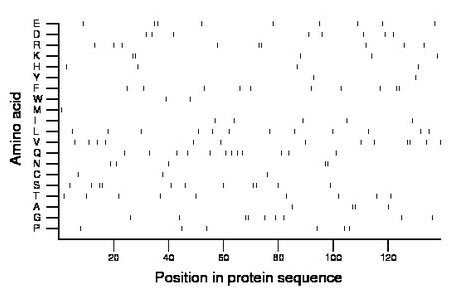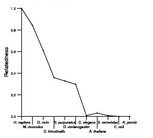
| Name: NR2C2AP | Sequence: fasta or formatted (139aa) | NCBI GI: 28882043 | |
|
Description: TR4 orphan receptor associated protein TRA16
|
Referenced in:
| ||
|
Composition:

Amino acid Percentage Count Longest homopolymer A alanine 2.9 4 2 C cysteine 2.2 3 1 D aspartate 5.8 8 1 E glutamate 6.5 9 2 F phenylalanine 7.2 10 2 G glycine 6.5 9 2 H histidine 2.9 4 1 I isoleucine 3.6 5 1 K lysine 3.6 5 2 L leucine 8.6 12 1 M methionine 0.7 1 1 N asparagine 3.6 5 2 P proline 4.3 6 1 Q glutamine 8.6 12 1 R arginine 6.5 9 2 S serine 7.9 11 2 T threonine 6.5 9 1 V valine 9.4 13 2 W tryptophan 1.4 2 1 Y tyrosine 1.4 2 1 |
Comparative genomics:
Search single species RefSeq proteins at NCBI
Search summary 
Figure data | ||
Related human proteins:Protein Relative score Description Self-match 1.000 TR4 orphan receptor associated protein TRA16 ODZ1 0.019 odz, odd Oz/ten-m homolog 1 isoform 3 ODZ1 0.019 odz, odd Oz/ten-m homolog 1 isoform 2 ODZ1 0.019 odz, odd Oz/ten-m homolog 1 isoform 1 MANBA 0.019 mannosidase, beta A, lysosomal OBSCN 0.015 obscurin, cytoskeletal calmodulin and titin-interac... PCDH15 0.015 protocadherin 15 isoform CD1-4 precursor PCDH15 0.015 protocadherin 15 isoform CD1-10 precursor PCDH15 0.015 protocadherin 15 isoform CD3-2 precursor PCDH15 0.015 protocadherin 15 isoform CD3-1 precursor PCDH15 0.015 protocadherin 15 isoform CD2-2 precursor PCDH15 0.015 protocadherin 15 isoform CD2-1 precursor PCDH15 0.015 protocadherin 15 isoform CD1-9 precursor PCDH15 0.015 protocadherin 15 isoform CD1-7 precursor PCDH15 0.015 protocadherin 15 isoform CD1-6 precursor PCDH15 0.015 protocadherin 15 isoform CD1-2 precursor PCDH15 0.015 protocadherin 15 isoform CD1-1 precursor KRT78 0.008 keratin 5b ERI2 0.008 exoribonuclease 2 isoform 1 ERI2 0.008 exoribonuclease 2 isoform 2 LOC647020 0.004 PREDICTED: similar to acidic (leucine-rich) nuclear... LOC647020 0.004 PREDICTED: similar to acidic (leucine-rich) nuclear... LOC647020 0.004 PREDICTED: similar to hCG1791241Human BLASTP results (used to prepare the table) | |||
Gene descriptions are from NCBI RefSeq. Search results were obtained with NCBI BLAST and RefSeq entries. When identical proteins are present, the self-match may not be listed first in BLASTP output. In such cases, the table above has been reordered to place it first.
See About the Figures for the scoring system used in the figure above right. The same scoring system was used in the table of BLASTP results.
Guide to the Human Genome
Copyright © 2010 by Stewart Scherer. All rights reserved.
